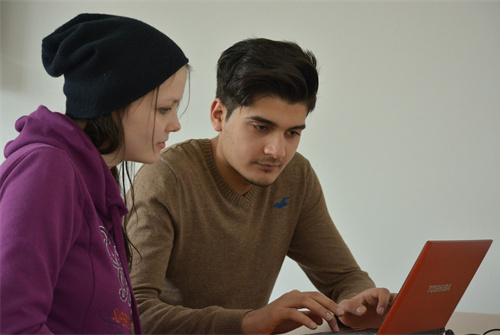【简介】感谢网友“网络整理”参与投稿,这里小编给大家分享一些,方便大家学习。
2024年6月英语四级作文必备短语
【第1句】: 接触各种思想/经历:be exposed to new ideas/experiences/problems
【第2句】: 人们认为:it is generally/widely believed/held/agreed that
【第3句】: 许多问题:a host/ number of problem
【第4句】: 引起人们注意:claim call/attract general/public/world attention to sth.
【第5句】: 意识到:there is a growing awareness(知道)/realization of/that,awaken sb. To the fact/danger
【第6句】: 适应新的形势/变化:adapt/adjust/accommodate(使适应) oneself to new environment/ change
【第7句】: 越来越:be increasingly +adj.,be on the rise,a growing number of
【第8句】: 接触社会:come into frequent/close contact with the world/society
【第9句】: 获得成功:achieve/accomplish success
【第10句】: 提出观点/建议:advance/put forward/come up with the arguments/ideas/suggestions
【第11句】: 作出努力:make tremendous(极大的)/persistent(持久稳固的)/sustained(持续不变的) effort to do sth.,take great pains to do(with work/study)
【第12句】: 影响学习:interfere with studies/work
【第13句】: 产生影响:have/exert a profound(深刻的) influence on life/personality,have a dramatic/ undesirable(令人不快的) effect on
【第14句】: 较好地驾驭生活:be a better pilot of one’s life
【第15句】: 剥夺机会/权力:deprive oneself of the chance/right/opportunity
【第16句】: 取代:substitute(替代) for/take the place of the old way
【第17句】: 采取措施:take effective steps/measures to
【第18句】: 控制我们的环境:take/gain increasing control over our own environment
【第19句】: 躲避危险/挑战:shy(躲避)/run away from the dangers/challenge
【第20句】: 满足要求:meet/satisfy/accommodate the demand of
【第21句】: 补偿损失:compensate for / make up for the loss/damage
【第22句】: 解释某现象:account for / explain the phenomenon
【第23句】: 对……很好的`了解:have a better understanding/appreciation of,have a new perspective(观点) on,provide/gain an insight into
【第24句】: 把某因素考虑进去:take sth. into account(consideration),give much thought to
【第25句】: 品位人生/自由青春:savor the life/freedom/youth
【第26句】: 培养对……的信心:develop/foster one’s interest/confidence in
【第27句】: 经历变化/困难/艰险:undergo/experience great changes/hardships/experience
【第28句】: 表现出自信心等: project one’s confidence/feeling/image
【第29句】: 生活充满不公正的地方:life is full of minor irritation/injustice
【第30句】: 追求学习/职业:pursue one’s academic(理论的) interest/professional career
【第31句】: 学习知识/技术:pursue/acquire knowledge/technology/skill
【第32句】: 被看作学习的……榜样:be held up as a good example
【第33句】: 交流经验/知识:share experience/ideas/problems/knowledge
【第34句】: 发挥/起到重要作用:play an (important/active/great)role/part
【第35句】: 逃学/缺课:skip school/a class/a meeting/a lecture
【第36句】: 知识/经验丰富:rich in knowledge/experience
【第37句】: 确立/追求目标:set/pursue a goal/higher standard
【第38句】: 到达目标:achieve/accomplish/stain the goal/aim/object
【第39句】: 克服困难:overcome obstacles/difficulty
【第40句】: 面临危险/困难:be confronted/faced with/in the face of danger/difficulty
【第41句】: 阻碍了成功:stand in the way of success,be an obstacle(障碍)/barrier to success/ growth
【第42句】: 阻碍了发展:hamper/impede/stunt the development of
【第43句】: 持传统的看法:hold conventional wisdom
【第44句】: 发表看法:voice/express one’s opinion
【第45句】: 持相反/合理的观点:take the opposite/fresh view
【第46句】: 揭穿某种一贯的说法:shatter the myth of
【第47句】: 求得帮助:enlist one’s support/help
【第48句】: 建立在大量的学习/实践上:build on tremendous amount of study/practice
【第49句】: 把成功/错误归咎于:attribute/own the success/failure to
【第50句】: 对……重要:be indispensable/important/vital to
初中英语短语与句型(必备)
下面是语文迷为大家整理的常用的英语短语集锦,希望对大家写英语作文有所帮助。
【第1句】:动词+介词
【第1句】:look at…看…, look like … 看上去像……, look after …照料…
【第2句】:listen to…听…… 【第3句】:welcome to…欢迎到……
【第4句】:say hello to …向……问好 【第5句】:speak to…对……说话
此类短语相当于及物动词,其后必须带宾语,但宾语无论是名词还是代词,都要放在介词之后。
【第2句】:动词+副词
“动词+副词”所构成的短语义分为两类:
A.动词(vt.)+副词
【第1句】:put on 穿上 【第2句】:take off脱下 【第3句】:write down记下
此类短语可以带宾语,宾语若是名词,放在副词前后皆可;宾语若是人称代词,只能放在副词前面。
B.动词(vi)+副词。
【第1句】:come on赶快 【第2句】:get up起床 【第3句】:go home回家
【第4句】:come in进来 【第5句】:sit down坐下 【第6句】:stand up起立
此类短语属于不及物动词,不可以带宾语。
【第3句】:其它类动词词组
【第1句】:close the door 【第2句】:1ook the same 【第3句】:go to work/class 【第4句】:be ill 【第5句】:have a look/seat 【第6句】:have supper 【第7句】:1ook young 【第8句】:go shopping 【第9句】:watch TV/games 【第10句】: play games
[介词短语聚焦]
“介词+名词/代词”所构成的短语称为介词短语。现将Unitsl-16常用的介词短语按用法进行归类。
【第1句】:in+语言/颜色/衣帽等,表示使用某种语言或穿着……。
【第2句】:in + Row/ Team/ Class/ Grade等,表示“在……排/队/班级/年级”等。
【第3句】:in the morning/ afternoon/ evening/ 表示“在上午/下午/傍晚”等一段时间。
【第4句】:in the desk/ pencil-box/bedroom 等表示“在书桌/铅笔盒/卧室里”。
【第5句】:in the tree表示“在树上 (非树本身所有)”;on the tree表示“在树上(为树本身所有)”。
【第6句】:in the wall表示“在墙上(凹陷进去)”;on the wall表示“在墙上(指墙的表面)”。
【第7句】:at work(在工作)/at school(上学)/at home(在家)应注意此类短语中无the。
【第8句】:at + 时刻表示钟点。 【第9句】:like this/that表示方式,意为“像……这/那样”。
【第10句】:of短语表示所属关系。 【第11句】:behind/ beside/ near/ under+ 名词等,表示方位、处所。
【第12句】:from与to多表示方向,前者意为“从……”,后者意为“到……”。
另外,以下这些短语也必须掌握。如:on duty, after breakfast, at night, at the door, in the middle, in the sky, on one’s bike等。
[重点句型大回放]
【第1句】:I think…意为“我认为……”,是对某人或某事的看法或态度的一种句型。其否定式常用I don’t think…,
【第2句】:give sth. to sb./ give sb. sth. 意为“把……给……”,动词give之后可接双宾语,可用这两种句型;若指物的宾语是人称代词时,则只能用give it/ them to sb.
【第3句】:take sb./ sth. to…意为“把……(送)带到……”,后常接地点,也可接人。
【第4句】:One…, the other…/One is…and one is…意为“一个是……;另一个是……”,必须是两者中。
【第5句】:Let sb. do sth. 意为“让某人做某事”,人后应用不带to的动词不定式,其否定式为Don’t let sb,do sth.,或Let sb. not do sth. 另外,Let’s 与Let us的含义不完全相同,前者包括听者在内,后者不包括听者在内,
【第6句】:help sb. (to) do sth./help sb. with sth.意为“帮助某人做某事”,前者用不定式作宾补,后者用介词短语作宾补,二者可以互换. Help… out
【第7句】:What about…?/How about…?意为“……怎么样?”是用来询问或征求对方的观点、意见、看法等。about为介词,其后须接名词、代词或V-ing等形式。
【第8句】:It’s time to do…/ It’s time for sth. 意为“该做……的`时间了”,其中to后须接原形动词,for后可接名词或V-ing形式。
【第9句】:like to do sth./like doing sth.意为“喜欢做某事”, 前一种句型侧重具体的一次性的动作;后一种句型侧重习惯性的动作,
【第10句】:ask sb.(not) to do sth. 意为“让某人(不要)做某事”,其中ask sb.后应接动词不定式,
【第11句】:show sb. sth. / show sth. to do. 意为“把某物给某人看”,该句型的用法同前面第2点。
【第12句】:introduce sb. to sb. 意为“把某人介绍给另一人”;introduce to sb.则是“向某人作介绍”。
[重点短语快速复习]
【第1句】:kinds of 各种各样的 【第2句】: either…or…或者……或者……,不是……就是……
【第3句】: neither…nor…既不……也不…… 【第4句】: Chinese tea without, anything in it 中国清茶
【第5句】: take a seat 就坐 【第6句】: home cooking 家常做法
【第7句】: be famous for 因……而著名 【第8句】: on ones way to在……途中
【第9句】: be sick/ill in hospital生病住院 【第10句】: at the end of在……的尽头,在……的末尾
【第11句】: wait for 等待 【第12句】: in time 及时
【第13句】: make one’s way to…往……(艰难地)走去
【第14句】: just then 正在那时 【第15句】: first of all 首先,第一
【第16句】: go wrong 走错路 【第17句】: be/get lost 迷路
【第18句】: make a noise 吵闹,喧哗 【第19句】: get on 上车
【第20句】: get off 下车 【第21句】: stand in line 站队
【第22句】: waiting room 候诊室,候车室 【第23句】: at the head of……在……的前头
【第24句】: laugh at 嘲笑 【第25句】: throw about 乱丢,抛散
【第26句】: in fact 实际上 【第27句】: at midnight 在半夜
【第28句】: have a good time=enjoy oneself玩得愉快
【第29句】: quarrel with sb. 和某人吵架 【第30句】: take one’s temperature 给某人体温
【第31句】: have/get a pain in…某处疼痛 【第32句】: have a headache 头痛
【第33句】: as soon as… 一……就…… 【第34句】: feel like doing sth. 想要干某事
【第35句】: stop…from doing sth. 阻止……干某事 【第36句】: fall asleep 入睡
【第37句】: again and again再三地,反复地 【第38句】: wake up 醒来,叫醒
【第39句】: instead of 代替 【第40句】: look over 检查
【第41句】: take exercise运动 【第42句】: had better(not) do sth. 最好(不要)干某事
【第43句】: at the weekend 在周末 【第44句】: on time 按时
【第45句】: out of从……向外 【第46句】: all by oneself 独立,单独
【第47句】: lots of=a lot of 许多 【第48句】: no longer/more=not…any longer/more 不再
【第49句】: get back 回来,取回 【第50句】: sooner or later迟早
【第51句】: run away 逃跑 【第52句】: eat up 吃光,吃完
【第53句】: run after 追赶 【第54句】: take sth. with sb. 某人随身带着某物
【第55句】: take(good) care of…=look after…(well) (好好)照顾,照料
【第56句】: think of 考虑到,想起 【第57句】: keep a diary 坚持写日记
常用英语短语
【第1句】: go to school 上学(用于专业的)go to the school 去学校(不一定是上学)
【第2句】: good way to 好方法
【第3句】: hate to do 讨厌没做过的事hate doing 讨厌做过的事
【第4句】: have a party for sb 举办谁的晚会
【第5句】: have a talk 听报告 谈一谈
【第6句】: have been doing 现在完成进行时eg : You have been talking You have been sleeping since
【第7句】: have been to …( 地方)……去过某过地方have gone to …(地方) 去了某地还没回来
【第8句】: have fun +doing 玩得高兴
【第9句】: have sth to do 有什么事要做
【第10句】: have to do sth 必须做某事
【第11句】: have trouble (problem) (in) doing sth 做什么事情有麻烦
【第12句】: have…time +doing
【第13句】: have…(时间)…off 放……假eg: I have month off 我请一个月得假
【第14句】: hear sb +do/doing 听见某人做某事/正在做某事
【第15句】: help a lot 很大用处
【第16句】: help sb with sth \one's sth 帮助某人某事(某方面)help sb (to) do sth 帮助某人做某事
【第17句】: hope to do sth 希望做某事
【第18句】: How about(+doing) = What about(+doing)
【第19句】: how do you like = what do you think of 你对什么的看法
【第20句】: if : 是否=wether
【第21句】: eg: I don't know if (wether) I should go to the party 我不知道我是否应该去参加晚会
【第22句】: He don't know if (wether) we will arrive on time tomorrow morning 他不知道我们明天早上是否能准时到达
【第23句】: if :如果,假如(全部接一般时态)+条件语态从句
【第24句】: in one's opinion = sb think 某人认为
【第25句】: in some ways 在某些方面
【第26句】: in the end = finally(adv) 最后
2024大学英语四级作文高频短语
【第1句】: at the thought of一想到…
【第2句】: as a whole (=in general) 就整体而论
【第3句】: at will 随心所欲
【第4句】: (be) abundant in(be rich in; be well supplied with) 富于,富有
【第5句】: access(to) (不可数名词) 能接近,进入,了解
【第6句】: by accident(=by chance, accidentally)偶然地,意外. Without accident(=safely) 安全地,
【第7句】: of one's own accord(=without being asked; willingly; freely)自愿地 ,主动地
【第8句】: in accord with 与…一致 . out of one's accord with 同…。不一致
【第9句】: with one accord (=with everybody agreeing)一致地
【第10句】: in accordance with (=in agreement with) 依照,根据
【第11句】: on one's own account
1) 为了某人的缘故, 为了某人自己的利益
2) (=at one's own risk) 自行负责
3) (=by oneself)依靠自己
【第12句】: take…into account(=consider)把..。考虑进去
【第13句】: give sb. an account of 说明, 解释 (理由)
【第14句】: account for (=give an explanation or reason for) 解释, 说明。
【第15句】: on account of (=because of) 由于,因为。
【第16句】: on no account(=in no case, for no reason)绝不要,无论如何不要(放句首时句子要倒装)
【第17句】: accuse…of…(=charge…with; blame sb. for sth. ; blame sth. on sb. ; complain about) 指控,控告
【第18句】: be accustomed to (=be in the habit of, be used to)习惯于。
【第19句】: be acquainted with(=to have knowledge of) 了解; (=to have met socially) 熟悉
【第20句】: act on 奉行,按照…行动; act as 扮演; act for 代理
【第21句】: adapt oneself to(=adjust oneself to) 使自己适应于
【第22句】: adapt…(for) (=make sth. Suitable for a new need) 改编, 改写(以适应新的`需要)
【第23句】: in addition (=besides) 此外, 又, 加之
【第24句】: in addition to(=as well as, besides, other than)除…外
【第25句】: adhere to (=abide by, conform to, comply with, cling to, insist on, persist in, observe, opinion, belief ) 粘附; 坚持, 遵循
【第26句】: adjacent(=next to, close to) 毗邻的, 临近的
【第27句】: adjust..(to) (=change slightly)调节; 适应;
【第28句】: admit of (=be capable of, leave room for) …的可能,留有…的余地。
【第29句】: in advance (before in time) 预告, 事先
【第30句】: to advantage 有利的,使优点更加突出地
英语四级作文:关于网络
Directions: For this part you are allowed 30 minutes to write a composition on the topic Internet. You should write at least 120 words and base your composition on the outline below:
【第1句】:互联网使用的现状,
【第2句】:大学生是否应该使用互联网,人们的'看法不同,
【第3句】:我的看法。
范文
In recent years, people are developing an inseparable relationship with Internet. As is known to all, it is convenient for us to click the mouse when surfing on line, either to entertain ourselves or to meet the work’s needs.
On the one hand, no one denies that Internet is currently one of the most useful media in our daily life. As a college student, I get on line every day to exchange information through e-mails with my net friends. But on the other hand, a good many people admit that they are too much addicted to Internet to maintain a regular and wholesome lifestyle.
Thus, it is necessary for us to use Internet in a reasonable way and restrain from overindulgence. After all,Internet is invented to enrich our life, and to improve the efficiency of our work rather than shackle us with a chain.
英语四级观点类作文模板
模版1
Different people have different views on_____.Some people think that_____,whereas others aegue that __________.
As far as I am concerned, I agree with the opinion that ___________.For one thing,I firmly believe that ___________.For another,_____________.Just think of________,who/which_______.
Taking all these factors into consideration,we may safely come to the conclusion that______.Only if_______can we _______,just as the saying goes,________________.
模版2
In recent years there have been many reports of ________.It turns a new chapter of _________in China,and will have far-reaching effects in the forthcoming years.
The biggest benefit,in my eyes,is that_______.In addition,_______.Finally,______________.
Apart from the benefits mentioned above,we should also face several unavoidable challenges.In the first place,_____________.In the second place,________.What’s more,_______________.In summary,we should_______________.
模版3
Nwadays more and more ______are commonly and widely used in everyday life,ranging from __________to_____________.
The popularity of _______will have a great influence on ______.On the one hand,_________.On the other hand,__________.
To conclude,____________are just like a double-edged sword.With them we may________.However,one point should be kept in mind that we should make sensible use,always being a master instead of slaving of them.









